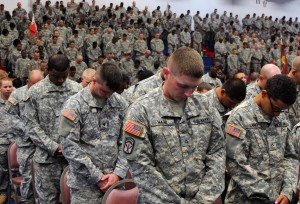 Long long ago I spent two years stationed at the Pentagon as a JAG officer. Early on I discovered that, daily at noon, a cadre of my fellows attended mass down the hall where a proper room had been set aside for the purpose. I was not surprised; even as a draftee in 1953 I had learned the Army provided opportunity, not only to visit the various chaplains, but for communal worship according to individual religious commitment. This was not just “released time”; the Army paid for it all. In 1985, a federal court of appeals held this to be a constitutional duty of government.
Long long ago I spent two years stationed at the Pentagon as a JAG officer. Early on I discovered that, daily at noon, a cadre of my fellows attended mass down the hall where a proper room had been set aside for the purpose. I was not surprised; even as a draftee in 1953 I had learned the Army provided opportunity, not only to visit the various chaplains, but for communal worship according to individual religious commitment. This was not just “released time”; the Army paid for it all. In 1985, a federal court of appeals held this to be a constitutional duty of government.
So far as I can see, little of this policy has changed in the military, though its justification today is supported as much by the free contract that constitutes enlistment; access to religious practice is a promise of the government that is a basic tool of recruitment. In my day, the military draft made this policy of the Army imperative, not only as a First Amendment responsibility but simply as a matter of justice. No Western nation would pluck a person from his home and family to serve any civic imperative without assuring that – as the requirements of his particular task allowed – he could pursue and perfect his own religious commitment through counsel, study and communal devotion.
Or would it? Consider the American system of state-imposed education and specifically the “public” school. Schooling is compulsory; the child is drafted to serve a civic imperative. It may not be full-time duty; but for the most receptive hours of the child’s days, for 12 years, the experience of being educated by unchosen strangers is intellectually and emotionally preemptive – and even dominant. Nor is there any lack of homework to conscript what remains of the day – and all of this for 12 years, a tour of duty three times that of all but a few soldiers. Schooling in this environment approaches a conscription of the mind; indeed, that is its point. Paradoxically, the experience can eventually be liberating, but within state schools it can be so only within a vision of life’s purpose narrowed by the absence of transcendence. Many Americans do not regard this as liberation.
By contrast to the Army – both that of 1953 and now — these state schools provide their intellectual draftees neither chaplains nor invitations to pray together in the manner of their parents (or even of their own). Nor do they receive instruction in the content of their own family’s beliefs. If the parents can afford it, the opportunity for a more inclusive curriculum is available in a less conscriptive private school. But for the rest of American families, there is only the daily seven hours absorbing the wisdom of the intellectual descendants of John Dewey.
The charter school, though a salutary reform, is no exception; the mind of the child is still to be carefully insulated from any suggestion that the good life implicates the transcendental or even that there is such a dimension to human existence. The school may teach that some people believe such things, but it may not prefer any such idea even in the ways so familiar to the soldier. It lacks even foxholes.
The public school draft could end its undemocratic and class separative effect with the most simple adjustment – the option for the charter school to teach religion.
As charters continue to proliferate, the recognition of their freedom to teach and practice a religious (or anti-religious) faith would become the most effective liberation of the underclass in half a century. It would complete and confirm the promise of government to extend authentic school choice to every level of income – affirming that the assignment to a particular school is essentially a private decision to be unencumbered by any remnant of historic religious bias. Charters are today already largely private in their operation and completely so in their selection by families; can government continue this crude exception to the general rule of free religious choice without confronting the First Amendment? Where is the accommodation for the transcendental that any buck private would expect and experience during compulsory attendance at his assigned post?
There are a half dozen cogent legal arguments supporting the constitutional right of conscripted school children to expect faith-based content congenial to the parent. My only purpose here has been to emphasize the relevance of the sometimes neglected reality of compulsion by government. Few among us would object to the basic requirement of schooling. But, unless some major practical impediment makes faith-based schooling inordinately costly, difficult, or dangerous, it is hard to justify the existing empire of secular compulsion except as a relic of prejudice.


